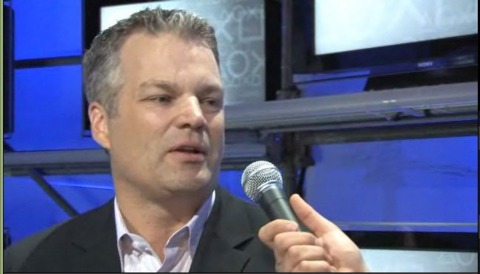Sony's Dille talks PS3 marketing evolution
MI6 2010: SCEA's marketing chief outlines shifting the PS3 ad focus from arrogant to amusing "It Only Does Everything" campaign.
Who was there: Peter Dille, senior vice president of marketing and PlayStation Network for Sony Computer Entertainment America delivered the opening keynote address to the MI6 games marketing conference.

What they talked about: While the people who make games have had plenty of opportunity to exchange ideas, network, and pat each other on the back this year at events like the Game Developers Conference and D.I.C.E., those who market games are only now getting the same opportunity. The fifth annual MI6 conference took place in San Francisco today, with an opening keynote address delivered by one of the biggest marketing execs in the business today.
Dille opened with an overview of his presentation, "Redefining the Digital Living Room." As it exists today, Dille said the digital living room consists of a multitude of devices working together to simplify a person's life. Dille pointed to an old audio system as an example, with a receiver, tuner, tape deck, speakers, CD player, and turntable all separate components on a giant rack, all just for the purpose of playing music.
"Today of course, you have an iPod. Hopefully it's on a Sony docking device so we can be involved in the music business," Dille joked.
Whether it's looking through photos, checking Facebook updates, streaming music through Pandora, playing a game, or watching a Blu-ray movie, Dille said people just didn't know there were products for the living room that did all that. That was at the heart of Sony's switch to the current "It Only Does Everything" marketing campaign.
Dille acknowledged that the original PS3 marketing campaign didn't communicate the system's virtues very well. However, "I'd like to think even the best messaging in the world wouldn't have done a whole lot to sell a $600 game machine in a wretched economy," Dille said. He added the reception for the "It Only Does Everything" ads has been tremendous, with other territories asking Sony to take the marketing campaign around the world.
Just like console companies push exclusive games to sell their systems, Dille said SCEA is pushing original exclusive content to make the PlayStation Network a default destination for users. To that end, the company has created the downloadable gaming show Pulse, as well as the reality TV-style The Tester, in which a variety of gamers compete in a variety of contests to become a game tester.
"I love the tears," Dille joked after showing clips of heartbroken Tester contestants being booted from the show. "I think if my kid got voted off the show, I'd be like, 'Yeah! He can go to college!' But these guys really want to be a tester."
Online gaming is one of the fundamental features of the PlayStation Network, and Dille said Sony has noticed players hopping online to socialize as much as to compete in games. While people in the past would gather on the playground or by the water cooler to talk about movies and games they'd seen, online networks let people have those conversations within the games they enjoy. That was part of what made Call of Duty more than just another hit game, he said.
"If you didn't have it, not only were you left out of the conversation happening on the playground, you were left out of the conversation happening in your social circle," Dille said.
One area that needs improvement, Dille said, is to articulate to consumers what's possible with Sony's products. He acknowledged that shortcoming just after discussing the PSP's existing and upcoming remote play functions with the PS3, which will let users queue up downloads, play games, and watch movies on the console from the handheld, among other things.
In a post-presentation Q&A, Dille was asked what went wrong with the PSP Go and what Sony was doing to fix it. Dille explained there was a perception among people that the PSP Go would replace the existing line of UMD-equipped PSP systems, but that was never the case. "We've always said the majority of our business will be done on the PSP-3000," Dille said. Beyond that, Dille said Sony needs to continue to push for the product and better communicate to retailers why they should be carrying or promoting a gaming product for which they won't be selling any software.
When asked about the evolution of Sony's PS3 marketing over the years, Dille said the goal was just to change people's perceptions of the system from just being a game system to being a multipurpose machine. The original PlayStation 3 ads, filled with abstract imagery, creepy babies in white rooms and the like, were intended to get across the power of the system. However, Sony's research found people were intimidated by the ads, Dille said, and they played into some customers' notions of Sony as an arrogant company.
"We've done away with that," Dille said. "We're back with our mojo with the sense of humor people loved from older PS advertising. I think it's just a more likable connection to the consumer."
Quote: "We're very proud of our gaming heritage. But we don't see ourselves as just a gaming company," Dille said.
Takeaway: Another quote of Dille's summed up the presentation well. "For us, the living room is not a physical space. It's a seamless and personalized entertainment experience without walls. It's the ability to deliver information and entertainment value to consumers where and when they want it."
Got a news tip or want to contact us directly? Email news@gamespot.com
Join the conversation